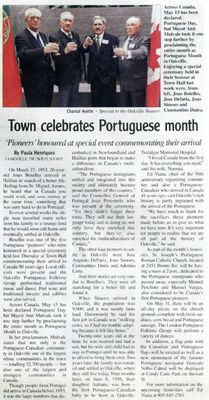Communal Boundaries & Ice Breaking
The earliest foundation of Portuguese Canadian communities in Eastern Canada, and particularly in Ontario, were relatively isolated and culturally independent because the pioneers and missionaries were actively seeking fellow Portuguese settlers to quickly establish a foothold for future generations to come. The network these gatekeepers established created a self-sufficient communal environment, and the majority of the settlers found no need to reach out beyond their communal gatekeepers due to the existing cultural familiarity and convenience. Communal boundaries between Portuguese and non-Portuguese groups began to emerge in the late 1970s with increasing connections between new Portuguese settlers and non-Portuguese Canadian communities. We saw a rapid increase in media coverage, political representations and public opinions regarding the life and cultural traditions of the Portuguese communities throughout the 1980s and 1990s. Starting with the gatekeepers who came to Canada in the 1950s and 1960s, Portuguese Canadian communities began establishing various social organizations to tell stories of the Portuguese diaspora to both the non-Portuguese and second-generation settlers. These organizations took various forms including sports clubs, communal cultural centres, religious assemblies, communal newspapers and also European clubs.

Transcending Memories
How does the ice-breaking of communal boundaries transcend through generations without breaking away from the gatekeeper-based communal networks, which seemed isolated and conservative when we first looked at them? For Portuguese communities, people's experience with wars played a big part in the historical process. Despite migrating to Canada, Portuguese settlers did not stray away from the cultural ties they had with their Portugal homeland across the Atlantic; instead, the communal networks maintained by gatekeepers and pioneers allowed all Portuguese to actively practice their cultural norms in their day-to-day lives. These networks also provided flows of information about the colonial conflict: stories were heard, and the call for peace and liberalization grew in both Canada and the Portuguese mainland. Second-generation migrants can better understand their fathers' struggle especially when veterans migrate to Canada and speak for themselves. Many colonial war veterans later became the representatives of their Portuguese communities all across Canada. The communal networks not only help veterans share their traumatic experiences, but also bond Portuguese settlers to their hometowns of Lisbona, Porto, Azore, Coimbra, Aveiro and all around Portugal. The communal ties helped spread the idea of peace and liberalization back and forth between Canada and Portugal, while reminding Portuguese Canadians of their cultural pride, encouraging them to pass it on to future generations.

Rememberance, Representations, and Beyond
Ever since the first Portuguese pioneer set foot on Canadian soil, connections were made in various forms: we saw Portuguese workers opening small businesses selling day-to-day groceries to others, labour migrants working alongside others constructing monumental skyscrapers in downtown Toronto, and factory workers contributing to Ontario's labour movements and economic prosperity. Since the late 1950s, Portuguese popular culture, veterans' war stories, and younger generations' participation in politics began nourishing Ontario's multicultural prosperity. The social transition and liberalization in Portugal gave the veterans, labour workers and younger generations the opportunities to better express themselves and bond with others. Thanks to the advancement of media and information technology, the cultural heritage of Portuguese Canadians can now be better documented and spread through popular media as well. People have been becoming more aware of Portuguese migrants' struggle, contribution, and cultural significance since the 1970s, and after almost 40 years of social bonding and cultural expressions, Portuguese Canadian communities have become an important part of Ontario society in its economy, cultural diversity and democracy.
